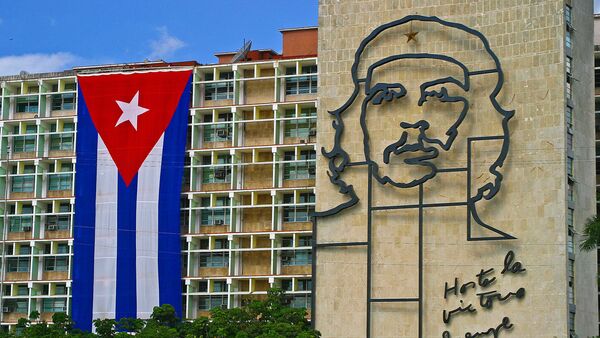José Ramón Cabañas, ambassador of the Republic of Cuba to the United States of America, told Radio Sputnik’s By Any Means Necessary Friday that the announcement was “simply a political game” aimed at shoring up Trump’s support base of right-wing Latinos in southern Florida, who could prove a decisive voting block in the November 2020 elections.
Cuba Raked Over Coals After Colombia Peace Talks
On Thursday, a senior Washington official told Reuters the Trump administration was considering a “convincing case” for adding Cuba to its list of state sponsors of terrorism. The news came just a day after the US State Department announced it had recategorized Cuba under the Arms Export Control Act as “not cooperating fully” with US counterterrorism efforts in 2019.
According to the State Department news release, the point of contention was that in 2019, leaders of the Colombian National Liberation Army (ELN) who had traveled to Cuba for peace talks with the Colombian government of President Iván Duque were not extradited to Bogota from Cuba after the peace talks fell apart following an attack on a Bogota police academy.
“As the United States maintains an enduring security partnership with Colombia and shares with Colombia the important counterterrorism objective of combating organizations like the ELN, Cuba’s refusal to productively engage with the Colombian government demonstrates that it is not cooperating with US work to support Colombia’s efforts to secure a just and lasting peace, security, and opportunity for its people,” the State Department said.
However, the State Department neglected to mention that as part of the carefully drafted conditions for those talks, Cuba agreed to provide guarantees for the guerrilla leaders that they would be allowed to return to their organization’s bases in the Colombian mountains in peace. Duque’s government refused to recognize the conditions of the talks, which were drawn up by his predecessor, Juan Manuel Santos, and demanded the ELN leaders be turned over to Colombian police.
The State Department notice also included a complaint that Cuba continues to harbor “several US fugitives from justice,” such as black revolutionary Assata Shakur, whom the FBI has put at the top of its Most Wanted List with a bounty on her head of $2 million.
‘A Political Game’
Cabañas noted that in 2017, Cuba and the US signed a memorandum of understanding extending their prior cooperation on fighting terrorism, but that it was the US - not Cuba - that “decided not to continue that cooperation.”
“It’s amazing that the State Department and the US government produce a list of countries that doesn’t cooperate fully with the United States and that Cuba is included,” Cabañas told host Sean Blackmon, noting “this happened the day after our minister talked to the media and asked, publicly, several questions to the US government, but particularly, to have a public response, a public condemnation, against a terrorist attack that was committed here, at the embassy premises on April 30.”
As Sputnik reported at the time, a Texas man attacked the Cuban Embassy in Washington, DC, early on the morning of April 30 with an AK-47 assault rifle, firing some 30 rounds and damaging the embassy’s facade. No one was injured, but the man was charged by Washington’s Metropolitan Police Department with assault with intent to kill, and officials marked the attack as a suspected hate crime.
“This is simply a political game, I mean, it is simply to satisfy politics in southern Florida, to respond to a very small group of politicians … that talk always about Cuba and forget about the interests of the constituency,” Cabañas said.
The ambassador said the ultimate goal of the US’ move “is simply to reinforce the embargo. It has not only legal, but economic consequences, because it limits the kind of trade you can establish.”
“We have been for many years a victim of terrorism” by the United States, Cabañas noted.
After the 1959 Cuban Revolution deposed the US-supported dictator Fulgencio Batista, Washington embarked on a long-standing campaign to sabotage the emerging socialist state. Its methods included industrial sabotage and psychological warfare under the aegis of the CIA’s “Operation Mongoose,” as well as 638 separate attempts to assassinate revolutionary leader Fidel Castro and even the terrorist bombing of Cubana Flight 455 in 1976, an operation masterminded by CIA agent and Cuban exile Luis Posada Carriles that killed 73 people. Posada was given shelter by the United States and died in Miami, Florida, in 2018.
US Targets Cuba’s Success Fighting COVID-19
Cabañas noted the US move would have consequences for Cuba’s attempts to fight the country’s COVID-19 outbreak, which has infected more than 1,800 people so far, but noted the country’s long standing focus on proactive and preventative health measures has greatly mitigated the pandemic’s effect on the country. By contrast, Cuban medical brigades are in 23 different countries, helping them to address the virus outbreaks there.
The ambassador said that amid such an example of international solidarity, which is popular even among Americans, officials in Washington “cannot allow that example to happen. Cuba is something bad for them because it is a different way of organizing things. Even heath, public health, is a human right; it’s in our constitution. Health is not a product in Cuba that you buy and sell, it’s a duty of the government to provide.”
“The way politicians in the United States try to react to that is not to try to do the same, to help the local population, [it is] simply to attack using arguments that have no sense,” he said. “We have been able not only to [build] such a health system, but to accompany that with education [for] the population, to accompany that [with] the biotech sector.”
“This pandemic is something wrong. All of us, we should be working together,” Cabañas said. “This could happen again. No one can react individually to that, and the only way to overcome the pandemic is to fight all together.”

